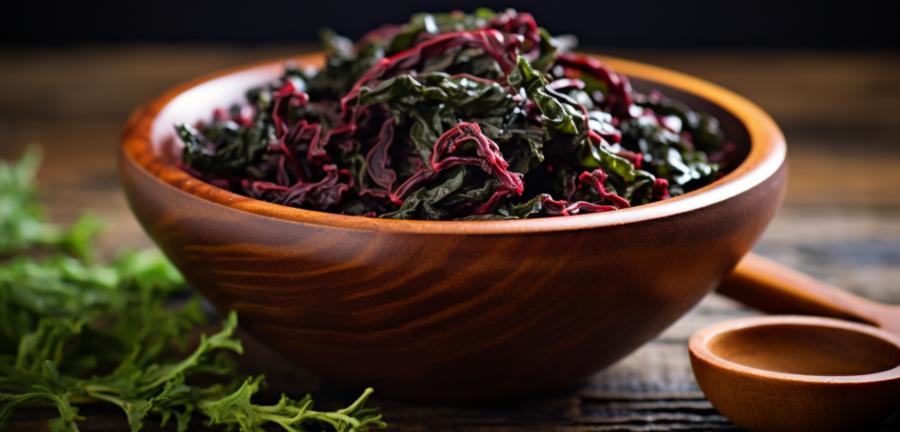Dulse Delight: The Seaweed Boost for Thyroid Health

Enter the Magical World of Seaweed
Imagine yourself on a picturesque, windswept beach, as the waves crash against the shore. Close your eyes and let the salty sea breeze tickle your nostrils. Now, bend down and pick up that slimy, slippery clump of seaweed that's been washed up to your feet. Yes, that's right. That soggy, unassuming mass of sea greens is none other than dulse, your ticket to thyroid health and a borderline supernatural existence.A Culinary Delight or a Health Elixir?
Although it might not look it, dulse is a delectable treat to be savored in your culinary exploits. No longer must you suffer with bland, tasteless health food. Think of dulse as the renegade cousin to kale or the daring offspring of spinach — a superhero of the veggie world, if you will.And let's not forget about its starring role in supporting thyroid health. Packed with essential nutrients like iodine, potassium, and magnesium, dulse is here to save the day (and your thyroid).
A Trip Down Memory Lane
Believe it or not, our ancestors were quite the seaweed connoisseurs. Dulse has been a staple in the diets of many coastal communities for centuries. In Ireland, they even have an old Gaelic saying: "An rud is annamh is iontach" — "What is rare is wonderful." They were clearly talking about dulse. Or maybe four-leaf clovers. Doesn't matter. The point is, dulse is a time-honored treasure that deserves a place in your diet.The Thyroid Chronicles
Now, let's talk about the real reason you're here: your thyroid. This small, butterfly-shaped gland in your neck is responsible for producing hormones that regulate your metabolism, energy, and mood. It's like the conductor of your body's hormonal orchestra.When your thyroid isn't functioning properly, it can lead to a cascade of health issues, such as fatigue, weight gain, depression, and even hair loss. So, I ask you, do you want to be the person who embraces dulse and its thyroid-boosting benefits? Or do you want to become a lethargic, balding lump of sadness? The choice is yours.
The Iodine Factor
As it turns out, iodine is the thyroid's best friend. Without it, your thyroid can't produce the hormones your body needs, leading to a condition known as hypothyroidism. Enter dulse, the iodine-infused savior of subpar thyroids.While iodized salt has become a common source of iodine in modern diets, why not take a more natural, whimsical route towards thyroid health? Dulse is not only a rich source of iodine but also a veritable smorgasbord of vitamins and minerals. Plus, it's a surefire way to impress (or utterly confuse) your dinner guests with your eclectic culinary prowess.
How to Enjoy Dulse: A Step-By-Step Guide
Now that you're fully on board with the dulse revolution, you're probably wondering how to incorporate this magical seaweed into your life. Fear not, for I have compiled a list of practical (and borderline eccentric) ways to enjoy dulse:- 1. Dulse and Cheese: Channel your inner Irishman and enjoy dulse as a crunchy, salty snack with cheese and crackers. It's the perfect appetizer for your next seaweed-themed soirée.
- 2. Smoothie Superfood: Unleash your inner health guru and add a handful of dulse to your morning smoothie for an iodine boost that'll make even the most kale-obsessed fitness fanatics green with envy.
- 3. Salad Surprise: Toss some dulse into your favorite mixed greens salad for a fun, unexpected twist on your typical leafy fare.
- 4. Souper Seaweed: Elevate your soup game by adding dulse to your favorite recipes — think clam chowder with a seaweed twist.
Final Thoughts
There you have it, my fellow dulse devotees. By embracing this slippery, slimy seaweed, you're not only taking a stand for thyroid health but also becoming a part of a centuries-old culinary tradition. So, go forth and conquer your local health food store, armed with the knowledge that you're about to embark on a wild, delicious journey towards dulse-infused wellness. And remember, as the Irish say, "An rud is annamh is iontach" — "What is rare is wonderful."Article kindly provided by healthyvoices.net
Latest Articles
- How Oral Health Quietly Influences Energy Sleep and Long Term Well Being
- How Emotions Affect Your Skin
- Everyday Walks as Brain Games for Your Dog
- How Light Weights Can Build Serious Strength
- Missing Dental Supplies and What They're Really Telling You
- Rethinking Early Intervention Strategies for Childhood Behavior Support
- Keep Going: The Brain Science of Turning Setbacks Into Momentum
- Designing Movement Routines That Don't Feel Like Exercise
- Chair Yoga Works Wonders For Bodies Of All Ages
- Eyebrows Through the Ages and What They Reveal About Our Faces
- Feeding Plans That Keep Every Pet in Balance
- Hidden Immune Boost Hiding in Plain Sight for Corporate Travellers
- Evening Quiet Isn't Automatic and That's Perfectly Normal
- Quiet Power Makes a Salon Feel Like a VIP Retreat
- Chewing as Meditation and Everyday Calm
- Sleep Deprivation as a Social Problem, Not a Personal Failure
- Why Recovery Rituals Outlast Resolutions and Keep Us Moving Forward
- Desk Job Survival with a Side of Shoulder Rolls
- Why Your Living Room Layout Might Be Causing Your Back Pain
- Why Your Teeth Love Dental Hygienists
- Nutrition and Dietetics
- Exercise and Fitness
- Meditation and Yoga
- Mental Health
- Women's Health
- Men's Health
- Children's Health
- Senior Health
- Heart Health
- Sleep Health
- Skin Health
- Eye Health
- Dental Health
- Pain Management
- Addiction and Recovery
- Sexual and Reproductive Health
- Alternative Medicine
- Chronic Conditions
- Weight Management
- Occupational Health and Safety
- Public Health
- General Health Tips
- Beauty

